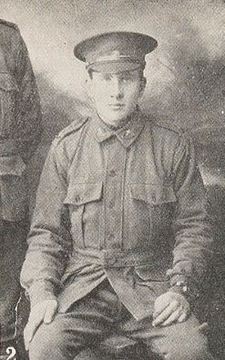WOODS, Charles
| Service Numbers: | 2902, T255459 |
|---|---|
| Enlisted: | 7 November 1939, Charles Stevens |
| Last Rank: | Private |
| Last Unit: | 6th Infantry Battalion |
| Born: | Mangana, Tasmania, 3 April 1899 |
| Home Town: | Railton, Kentish, Tasmania |
| Schooling: | Not yet discovered |
| Occupation: | Labourer |
| Died: | Old Age, Devonport, Tasmania, date not yet discovered |
| Cemetery: |
Devonport General Cemetery, Tasmania, Australia |
| Memorials: | Kentish Municipality Honour Roll Mural, Municipality of Kentish Honour Roll |
World War 1 Service
| 10 Sep 1915: | Involvement Private, 2902, 6th Infantry Battalion, --- :embarkation_roll: roll_number: '8' embarkation_place: Melbourne embarkation_ship: HMAT Star of Victoria embarkation_ship_number: A16 public_note: '' | |
|---|---|---|
| 10 Sep 1915: | Embarked Private, 2902, 6th Infantry Battalion, HMAT Star of Victoria, Melbourne |
World War 2 Service
| 7 Nov 1939: | Enlisted Australian Military Forces (WW2) , Private, T255459, Charles Stevens |
|---|
Help us honour Charles Woods's service by contributing information, stories, and images so that they can be preserved for future generations.
Add my storyBiography contributed by Adam Gore
Charlie was born on the 3rd of April 1899, in Mangana a little gold mining town near Tasmania’s east coast. He was just 14 years and 9 months old when, in January 1915, he tried to enlist at Claremont, just outside of Hobart. That’s younger than many of you here today. He told the army he was 21. His sense of duty was that strong.
But his dad, James, found him and brought him home to Railton.
But Charlie didn’t give up. Six months later, he made his way across Bass Strait to Melbourne, and on the 1st of July 1915, he enlisted again, this time successfully.
While most Tasmanians served in the 12th or 40th Battalion, part of the proud legacy of the 12th/40th Royal Tasmanian Regiment, who I’m representing today. Charlie was placed in the Victorian 6th Battalion. He was still only 15 when he boarded the Star of Victoria, bound for Egypt and eventually the frontlines of France. By the time Charlie arrived in Egypt, the first ANZACs had already retreated from their campaign in Gallipoli.
A campaign that had helped forge a national identity, one built not just on bravery, but on a sense of purpose. Our soldiers weren’t blindly following orders. They believed in what they were fighting for. They knew that German aggression in Europe threatened more than territory. It threatened the democratic values that Australians were beginning to cherish deeply. This was not just someone else's war, for Charlie and others like him it was a fight for a free world.
Charlie’s new mates in the 6th Battalion had seen the hardships of Gallipoli. Shortages of equipment, improvised weapons made from jam tins. But on the Western Front, there was no shortage of destruction. There, war was fought on an industrial scale. Artillery never stopped. Gas crept silently into the trenches. And death came fast and without warning.
On the first ANZAC Day in France, Charlie wrote that they marched to their third line of defence and set up barbed wire, with shells whistling overhead. And yet, they paused to mark the day — with a simple meal of fish, roast meat and vegetables. Even in war, they held tight to tradition, to memory, to what made them Australian.
In 2014, as part of my role as an Army musician, I had the honour of performing at Australia’s war memorials in Villers-Bretonneux and Bullecourt on the Western Front, in the lead-up to the centenary of Gallipoli.
I remember standing there in Bullecourt, reading about the conditions faced by my pop Charlie and his mates some 97 years earlier. Two meals a day — delivered under cover of darkness. At 3am, breakfast would be carried through enemy fire to reach the front lines by 5. Tea wouldn’t come until midnight. No warmth, no rest. Just duty.
Charlie was wounded, gassed, and hospitalised. But he kept returning to his unit. He fought on through the worst of it, through battles that scarred both land and soul. He came home in 1919, forever changed. He was one of the lucky ones. Thousands did not return. And those who did, carried the weight of that sacrifice for the rest of their lives.
Charlie’s story is not just a tale of youthful bravery. It’s a reminder that freedom is never free, that democracy, peace, and a just world require ordinary people to do extraordinary things. Australians like Charlie understood that. They lived it.
As we reflect on Gallipoli and the Western Front, let us remember the men and women who answered the call. Not for glory. Not for adventure. But out of duty. Out of love for their country and its values. Let us remember that Gallipoli may have been the birthplace of the ANZAC legend, but it was in the mud of France that our nation came of age.
Lest we forget.









